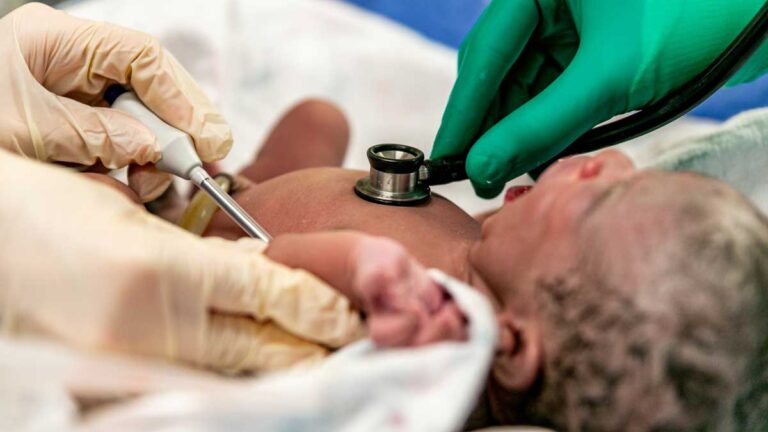SPRINGFIELD – As racial disparities in maternal and child health outcomes persist in the U.S., a new statewide initiative aims to promote equity in maternal health and improve outcomes for all women and children.
The latest report from the Illinois Department of Public Health (IDPH) found that about 75 women in Illinois die from pregnancy-related causes each year. Consistent with national trends, Black women are at greater risk than white women, and the vast majority of the deaths were preventable. Experts say the disparity is not due to race, but rather racism and structural barriers that women of color face when it comes to accessing health care.
In an effort to close the gap on racial disparities in maternal health, state public health officials are inviting birthing hospitals across Illinois to sign up for the Birth Equity Initiative — an effort by the Illinois Perinatal Quality Collaborative, or ILPQC.
ILPQC is a statewide network of health care providers, public health leaders and patient and community stakeholders working to improve health care outcomes for mothers and babies in Illinois. The collaborative is led by Dr. Ann Borders, a maternal fetal medicine physician at NorthShore University Health System.
The Birth Equity Initiative promotes the screening of patients during prenatal visits and during delivery admission for non-medical barriers to care.
These are “issues that may be impacting women’s health outcomes, but not what we typically think of measuring when you come to the doctor’s office,” Borders explains.
These issues — such as food insecurity, housing, transportation and childcare — are known as social determinants of health. Once identified, hospital staff can then connect patients with resources.
The initiative also supports hospitals in community engagement and in reviewing maternal health quality data by race, ethnicity and insurance status to identify disparities and opportunities for improvement.
For example, Borders says, hospitals can analyze data on rates of breastfeeding initiation, treatment for mothers with severe hypertension, or C-sections for first-time, low-risk women.
“What we want hospitals to start being able to do is to take those maternal health measures and look at it by race, ethnicity and Medicaid status, so they can start to [ask]: Where are local disparities in our quality data? And how do we need to target opportunities for improvement at our hospital?” Borders says.
Other strategies include standardizing patient safety education for new mothers before they’re sent home and providing hospital staff with racial bias training and education in providing respectful, patient-centered care.
“This is something we spent a lot of time with our patient focus groups: really hearing and listening what respectful care means to them,” Borders says. “And we’re working with other states who are also working on this topic to develop some resources that hospitals can use.”
The Birth Equity Initiative is one of many initiatives ILPQC has in place. Others include efforts to promote vaginal birth and reduce the C-section rate among low-risk, first-time mothers, to follow best practices on the use of antibiotics with newborns and to improve outcomes for mothers and newborns affected by opioids.
Borders says ILPQC would like to see every birthing hospital in the state sign up for its newest initiative, despite how overwhelmed many hospitals are right now.
“Coming through the pandemic, there has been incredible strain on hospitals,” Borders says. “What we want hospitals to understand is that… it’s really about taking the first step, and that we’re going to be moving through this as a journey.”
Patti Lee King, state project director and quality lead for ILPQC, says the group’s goal is to help health care providers support and learn from one another through its statewide initiatives and twice-a-year meetings, where hundreds of providers gather (virtually, during the pandemic) to learn from national experts in maternal and child health and share ideas amongst each other.
“It’s a really collaborative community,” King says. “It’s a lot of bringing people together, sharing things that work, helping each other improve together.”
When birthing hospitals work together to implement changes to their systems and practices to improve patient care, they can have greater impact, Borders says.
“A hospital working on initiatives by itself can only go so far,” she says. “They may make improvements, but when they’re learning from other hospitals — and seeing how other hospitals are doing this work — we see people more effectively and efficiently moving to change.”
In a letter to hospital administrators in March, IDPH Director Dr. Ngozi Ezike joined Borders in encouraging all hospitals to join the Birth Equity Initiative, which launches in the summer of 2021. Hospital teams that sign on will receive a quality improvement toolkit with resources to support the implementation of the initiative’s key strategies.
Interested hospitals can visit ILPQC.org or send an email to info@ilpqc.org to learn more.
Christine Herman is a reporter at Illinois Public Media. Follow her on Twitter: @CTHerman

